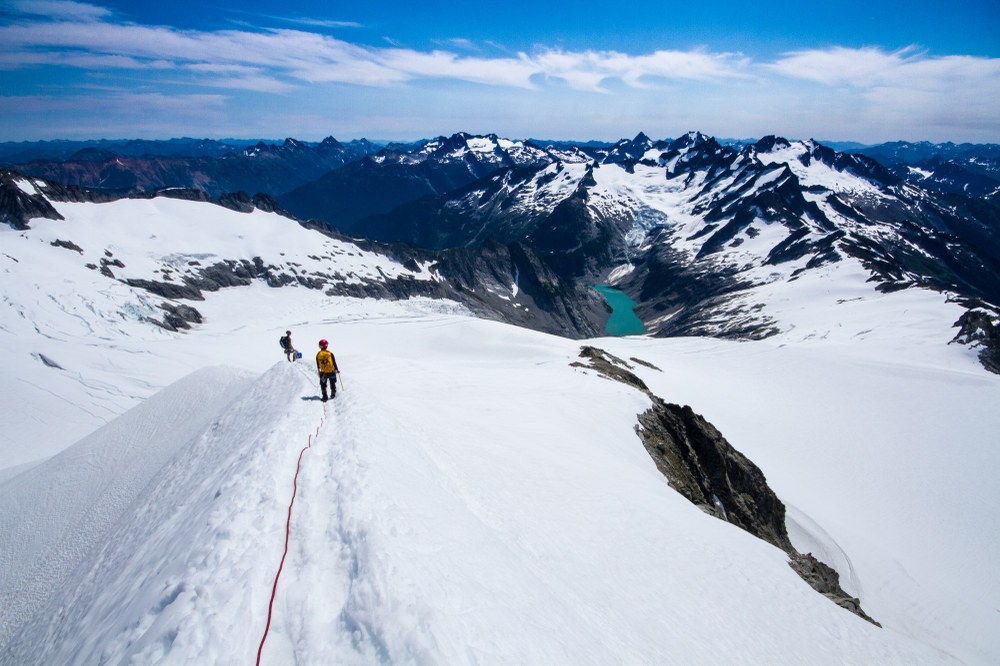
In terms of conditioning, "going the extra mile" means working to get stronger, faster, and fitter than you think you need to be for your trips. Many novices start training programs too late, thinking you can "cram" like you might for a test, or worse, "get by” without the proper preparation. Hurrying fitness will only result in sore or strained muscles, failure to reach your objectives, or worse, injury.
This thinking not only puts others at risk, but also means you'll have far less fun than you could. Why have adventures that you don't enjoy? Follow these three tips to help you prepare for the unexpected (and benefit from my mistakes):
Recognize that novelty = adrenaline
For someone facing a first-in-a-lifetime adventure, the exhilaration of the unknown takes up more energy than it does for someone who is familiar with the route or can anticipate what's coming. With any dramatic exposure or scary new task it’s easy to rely on adrenaline, like when you’re getting up for your first alpine start in the dark. While you may initially feel a burst of energy, relying on heightened adrenaline levels can leave you drained for days.
One of our first intermediate rock climbs was a running belay ridge climb of Forbidden, a low fifth-class climb with dramatic drop-offs on both sides. Not only had I never done running belays before, but collecting gear, having it swing awkwardly around my body as I raced to keep up, dealing with dramatic exposure, and combating poor sleep the night before all meant relying on pure adrenaline for most of the eighteen-hour day. It took several days to recover from a depleted adrenal system.
Focus on skill development
Novice mountaineers expend more energy doing basic tasks simply because they haven't yet mastered certain skills. It’s common for beginners to use extra energy going up steep slopes because they don't know how to place their feet. With experience, mainly by getting out on multiple training trips, you will develop proficiency. Until then, plan to compensate by developing greater cardiovascular stamina, strength, and power to keep up with the people in your group who have more experience.
The first time I climbed Mt. Rainier in 1990 (pre-Basic Climbing days!), the rest step and pressure breathing were foreign to me. When I started to feel nauseous, I panicked and did the best I could by plowing ahead twenty steps then breathing deeply, unaware that such start-and-stop would quickly exhaust me. I would have gladly shifted into using energy-saving techniques had I known about them. Now, at the first sign of nausea I shift into paused breathing steps without even thinking about it. My "conscious incompetence" shifted to "unconscious competence" through practice and increased skills.
Follow the 10% rule
Novice adventurers generally carry extra stuff, or rent equipment that may be heavier than gear experienced mountaineers acquire over many years. They’re also more likely to carry extra unnecessary items “just in case”. If you’ve only trained with the personal items you expect to carry, you may not develop the extra strength or endurance to carry your share of group gear or help in an emergency. For example, many novices on Mt. Rainier carry well over fifty pounds, whereas more experienced folks often climb with forty pounds or less. Be sure to account for this weight difference in your training.
To help offset the unexpected, build time into your conditioning season to go 10% farther in training hikes, carry 10% more weight for at least one of your conditioning trips, and build 10% more strength than you think you need. Then, when you encounter the inevitable obstacles, you'll be prepared.
This article originally appeared in our Summer 2019 issue of Mountaineer Magazine. To view the original article in magazine form and read more stories from our publication, click here.
Add a comment
Log in to add comments.Solid article Courtenay!
 Courtenay Schurman
Courtenay Schurman